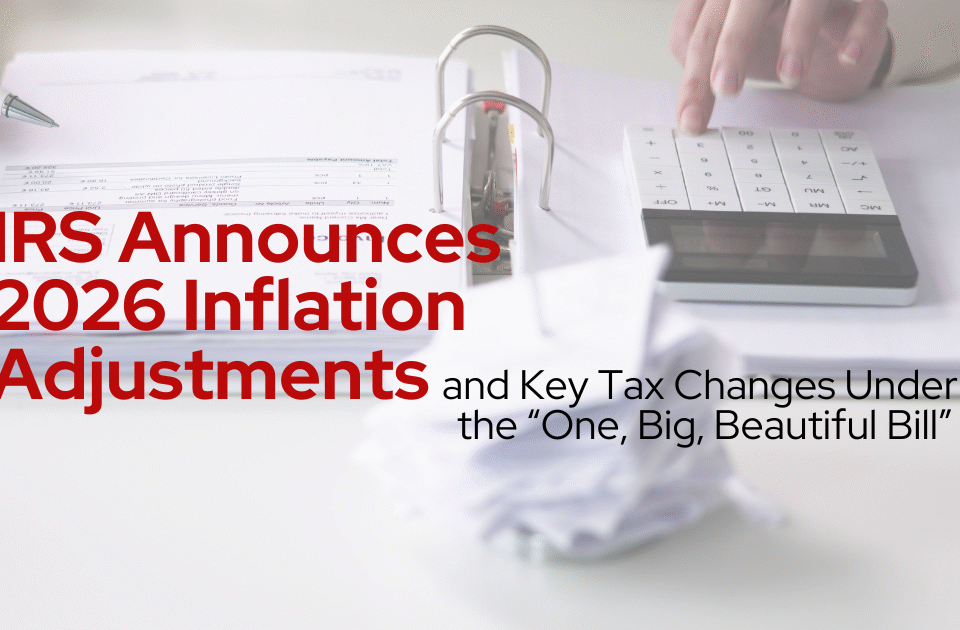
Casualty Loss Deduction: What You Need to Know
November 6, 2024
Key Steps for Small Business Owners to Start the Year Right
January 14, 2025The IRS has released its annual inflation adjustments for 2024 for over 60 tax provisions, including tax rate schedules, deductions, credits, and more. These updates, outlined in Revenue Procedure 2023-34, are essential for taxpayers as they prepare for filing their 2024 income tax returns in 2025. Here’s a summary of the most notable changes:
Standard Deductions for 2024
The standard deduction has increased, offering potential tax savings for many taxpayers:
- Married couples filing jointly: $29,200 (up $1,500 from 2023)
- Single taxpayers and married individuals filing separately: $14,600 (up $750 from 2023)
- Heads of households: $21,900 (up $1,100 from 2023)
Updated Marginal Tax Rates
The top marginal tax rate remains 37% for single taxpayers with incomes over $609,350 and married couples filing jointly with incomes over $731,200. Other tax brackets are as follows:
- 35%: Single incomes over $243,725; married incomes over $487,450
- 32%: Single incomes over $191,950; married incomes over $383,900
- 24%: Single incomes over $100,525; married incomes over $201,050
- 22%: Single incomes over $47,150; married incomes over $94,300
- 12%: Single incomes over $11,600; married incomes over $23,200
- 10%: Incomes below $11,600 (single) or $23,200 (married)
Additional Key Updates for 2024
Earned Income Tax Credit (EITC)
The maximum EITC for taxpayers with three or more qualifying children increases to $7,830, up from $7,430 in 2023.
Flexible Spending Arrangements (FSAs)
- Employee salary reductions for FSAs increase to $3,200 (up $200).
- Maximum carryover for unused amounts rises to $640 (up $30).
Medical Savings Accounts (MSAs)
- Self-only coverage: Annual deductible must be between $2,800 and $4,150, with a maximum out-of-pocket expense of $5,550.
- Family coverage: Annual deductible must be between $5,550 and $8,350, with a maximum out-of-pocket expense of $10,200.
Gift and Estate Tax Adjustments
- Annual gift exclusion: Increases to $18,000 (up from $17,000).
- Estate tax basic exclusion amount: Rises to $13,610,000 (up from $12,920,000).
Foreign Earned Income Exclusion
For taxpayers working abroad, the exclusion increases to $126,500, up from $120,000 in 2023.
What Remains Unchanged
Certain provisions are unaffected by inflation adjustments:
- Personal exemption: Remains at $0 (unchanged since the Tax Cuts and Jobs Act).
- Itemized deduction limitation: No limitations, as eliminated by the Tax Cuts and Jobs Act.
- Lifetime Learning Credit threshold: Phase-out starts at $80,000 modified adjusted gross income ($160,000 for joint filers).
Important Notes for Businesses
The reinstatement of the Hazardous Substance Superfund financing rate for crude oil and petroleum products marks a new development under the Inflation Reduction Act. For 2024, the tax rate is $0.26 per barrel, adjusted for inflation.
Stay Prepared for Tax Year 2024
These changes highlight the importance of staying informed and proactive with tax planning. At Anderson, Adkins & Company, we’re here to help you navigate these updates and optimize your tax strategy for the year ahead.
Questions? Contact us today at info@augustacpas.com or 706-288-2000 to schedule a consultation.
Disclaimer: This blog is for informational purposes only and should not be considered as legal or tax advice. Please consult with a tax professional for guidance specific to your situation.




